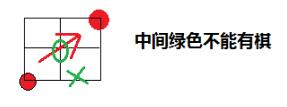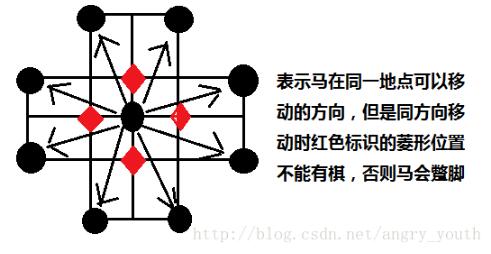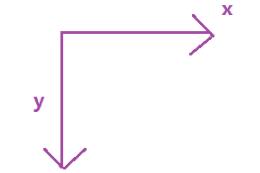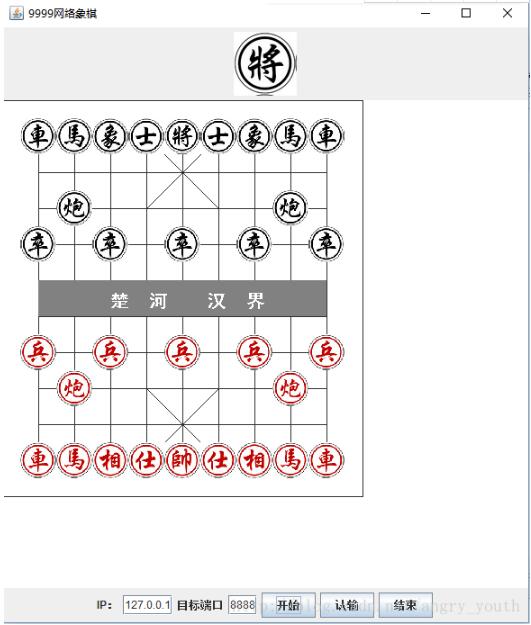java实现简单网络象棋游戏
本文实例为大家分享了java实现网络象棋游戏的具体代码,供大家参考,具体内容如下
游戏规则:
1.将/帅:不能出田字格,不能走斜线,只能前进后退向左向右,每次只走一格;
2.士/仕:不能出田字格,只能走斜线,每次只走一格;
3.象/相:只能走田字格,中间防止蹩脚,不能有棋;

4.马:只能走日,(这个比较麻烦,且看下图标识)

5.车:车只能走直线,这个很好理解,不细说了;
6.炮:
情况一:纯走路—->中间和目的地都不能有棋
情况二:吃棋—–>中间要有一颗棋,目标也有棋,且是敌方的棋,毕竟不能自己吃自己哈
7.卒/兵:
河这边:只能前进不能后退,不能横着走!!!
河对面:可以前进,可以横着走,不能后退!!!
面板设计

看上去一定很挫!哈哈,别急,听我细细道来!
一般的界面设计我们都知道横纵坐标是这样的:

但是我选择背道而行,不是因为别的,是为了更好的去让初学者理解,我们把原本的x坐标看成数组的列(col),把y坐标看成我们数组的行(row),这样是不是更好理解一点呢,当然了我就是这么理解的,哈哈,接下来的游戏代码编程我们会把横坐标用y*width,纵坐标用x*height你们应该就能理解为什么了,因为x是数组的行,也就是坐标纵坐标(y)的体现,同理数组中的y也是如此。
数据传输:这里我们采用UDP协议来进行通讯,所以你们也要先去了解一下UDP协议的一些基本方法,这里就不细讲了。
通讯协议:这里我们自定义通讯协议啊:
“play|”——–以此开头代表一端发出了游戏邀请,等待另一端的回应;
“connect|”——-以此开头代表另一端收到邀请并且同意建立连接通讯!如果邀请者受到这条消息就代表通讯建立成功,可以开始游戏了;
“move|”——以此开头代表移动数据传输,如果一端移动了棋子,那么另一端也要收到信息,重新绘制界面;
“lose|”——–以此开头代表一方认输,如果有一方认输就会向另一方发送该信息;
“quit|”——-以此开头代表一方退出游戏,任意一方离开都会向对方发送该信息,以提示对方;
“success|”—–以此开头代表胜利,某一方胜利就向对方发出信息,通知对方;
“regret|”——以此开头表示悔棋,这个不用讲了吧,大家都明白,但是本次编程中我没有把这个加进去,这个你们可以自己根据自己需要去添加。
(肯定有人问我这个协议是谁定义的,啊哈哈,让你们失望了,这是我自己定义的,这个通讯协议只适用于你们写的这个代码,和使用这个代码的两个人通讯使用,所以协议如何自己可以定义的哦)
代码实现
1.Chess类:
package internet_chess;
import java.awt.Graphics;
import java.awt.Image;
import java.awt.Point;
import java.awt.Toolkit;
import java.awt.image.ImageObserver;
import javax.swing.JPanel;
public class Chess {
public int Row = 12;
public int Col = 11;
public String chessName;//当前棋子对象的名字
public int owner;//当前棋子对象的所有者--黑方还是红方
public Point point;//当前棋子对象的位置
public Image chessImage;//当前棋子对象的图像
private int BLACKCHESS = 1;
private int REDCHESS = 0;//红方0,黑方1
private int width = 40;
private int height = 40;
public Chess(String name, int own,Point point)//获取每一个棋子对象名字,所有者,位置,和图片信息
{
this.chessName = name;
this.owner = own;
this.point = point;
if(owner == BLACKCHESS)//如果所有者是黑方
{
if(chessName.equals("将"))
{
chessImage = Toolkit.getDefaultToolkit().getImage("F:/Image/chess/0.png");
}
else if(chessName.equals("士"))
{
chessImage = Toolkit.getDefaultToolkit().getImage("F:/Image/chess/1.png");
}
else if(chessName.equals("象"))
{
chessImage = Toolkit.getDefaultToolkit().getImage("F:/Image/chess/3.png");
}
else if(chessName.equals("马"))
{
chessImage = Toolkit.getDefaultToolkit().getImage("F:/Image/chess/5.png");
}
else if(chessName.equals("车"))
{
chessImage = Toolkit.getDefaultToolkit().getImage("F:/Image/chess/7.png");
}
else if(chessName.equals("炮"))
{
chessImage = Toolkit.getDefaultToolkit().getImage("F:/Image/chess/9.png");
}
else if(chessName.equals("卒"))
{
chessImage = Toolkit.getDefaultToolkit().getImage("F:/Image/chess/11.png");
}
}
else//如果所有者是红方
{
if(chessName.equals("帅"))
{
chessImage = Toolkit.getDefaultToolkit().getImage("F:/Image/chess/16.png");
}
else if(chessName.equals("仕"))
{
chessImage = Toolkit.getDefaultToolkit().getImage("F:/Image/chess/17.png");
}
else if(chessName.equals("相"))
{
chessImage = Toolkit.getDefaultToolkit().getImage("F:/Image/chess/19.png");
}
else if(chessName.equals("马"))
{
chessImage = Toolkit.getDefaultToolkit().getImage("F:/Image/chess/21.png");
}
else if(chessName.equals("车"))
{
chessImage = Toolkit.getDefaultToolkit().getImage("F:/Image/chess/23.png");
}
else if(chessName.equals("炮"))
{
chessImage = Toolkit.getDefaultToolkit().getImage("F:/Image/chess/25.png");
}
else if(chessName.equals("兵"))
{
chessImage = Toolkit.getDefaultToolkit().getImage("F:/Image/chess/27.png");
}
}
}
protected void paint(Graphics g,JPanel i)//画棋子
{
g.drawImage(chessImage, point.y*width-width/2, point.x*height-height/2, width, height, (ImageObserver)i);
}
protected void paintSeclected(Graphics g)//画鼠标选择了以后的棋子对象的边框
{
g.drawRect(point.y*width-width/2, point.x*height-height/2, width, height);
}
public void SetPos(int x, int y)//重新设置移动以后的棋子对象的位置坐标
{
point.x = x;
point.y = y;
}
public void ReversePos()//将该对象的位置坐标逆置输出,用于方便显示信息情况
{
point.x = Row-1 - point.x;
point.y = Col-1 - point.y;
}
}
2.ChessPanel类:
package internet_chess;
import java.awt.Color;
import java.awt.Font;
import java.awt.Graphics;
import java.awt.Point;
import java.awt.event.MouseAdapter;
import java.awt.event.MouseEvent;
import java.io.IOException;
import java.net.DatagramPacket;
import java.net.DatagramSocket;
import java.net.InetAddress;
import java.net.SocketException;
import java.net.UnknownHostException;
import javax.swing.JOptionPane;
import javax.swing.JPanel;
public class ChessPanel extends JPanel implements Runnable{
private int BLACKCHESS = 1;
private int REDCHESS = 0;//黑棋是1,红旗是0
public Chess chess[] = new Chess[32];//创建了32个棋子对象
private int width = 40;
private int height = 40;
public int Row = 12;
public int Col = 11;//11行10列
public int map[][] = new int [Row][Col];
public int player;//设置当前玩家对象
private boolean isFirst = false;//判断是否是第一次点击的棋子,以此分开两次点击棋子的碰撞矛盾
private int x1,y1,x2,y2;//用来保存第一次第二次选中的坐标的
private boolean flag = true;//用来控制线程的运行
private boolean isPlay = false;
private Chess firstChess = null;
private Chess secondChess = null;//设置第一次点击的棋子和第二次选中的棋子对象
private InetAddress myID;//自己id地址
private InetAddress youID;//目标ID地址
private int sendport;//发送端口
private int receiveport = 8888;//接收端口
public ChessPanel()//构造函数
{
init_map();//初始化棋盘
//给这个面板添加鼠标监听机制
this.addMouseListener(new MouseAdapter()
{
public void mouseClicked(MouseEvent e)
{
if(isPlay == true)//判断是否该本方下棋
{
SelectChess(e.getPoint());//选择要移动的棋子
repaint();
}
}
public void SelectChess(Point pos)
{
int x = pos.x;
int y = pos.y;//获取此时此刻鼠标点击的位置坐标
System.out.println("选择要移动的棋子坐标:x->"+x+" y->"+y);
if(x > 0 && x < (Col-1)*width && y > 0 && y < (Row-1)*height)//判断鼠标是否在合理的范围,不在就直接退出
{
Point point = ReSetID(x,y);
if(isFirst)//判断是否是第一次选中的棋子
{
x1 = point.x;
y1 = point.y;
//判断第一次选中的棋子是不是自己的棋子或者是不是无效棋子,不是就失败
int id = map[x1][y1];
if(id != -1 && chess[id].owner == player)
{
isFirst = false;
firstChess = chess[id];
System.out.println("id->"+id);
}
else//第一次选择的棋子无效
{
JOptionPane.showConfirmDialog(null, "提示", "第一次选棋无效!请重新选择!", JOptionPane.OK_OPTION);
isFirst = true;
}
}
else//第二次选中的棋子
{
x2 = point.x;
y2 = point.y;
int id = map[x2][y2];
if(id != -1 && chess[id].owner != player)//第二次选择了敌方棋子,将敌方棋子保存起来
{
isFirst = true;
secondChess = chess[id];
//开始判断是否可以移动棋子,如果可以就将棋子移动,并发信息给对方我们已经移动的棋子信息
//判断是否可以移动棋子
if(IsMoveChess(firstChess,x2,y2))//可以移动-吃棋
{
int idx1 = map[x1][y1];
map[x1][y1] = -1;
map[x2][y2] = idx1;
chess[id] = null;
firstChess.SetPos(x2, y2);
repaint();
send("move|"+String.valueOf(idx1)+"|"+String.valueOf(Row-1-x2)+"|"+String.valueOf(Col-1-y2)+"|",youID,sendport);
if(id == 0)//吃掉了黑棋将军
{
send("success|红棋赢",youID,sendport);
isPlay = false;
JOptionPane.showConfirmDialog(null, "红棋胜利", "恭喜您,您赢了!", JOptionPane.OK_OPTION);
return;
}
else if(id == 16)//吃掉了红棋大帅
{
send("success|黑棋赢",youID,sendport);
isPlay = false;
JOptionPane.showConfirmDialog(null, "黑棋胜利", "恭喜您,您赢了!", JOptionPane.OK_OPTION);
return;
}
isFirst = true;
isPlay = false;
}
else//表示不能吃棋,重新下棋
{
JOptionPane.showConfirmDialog(null, "提示", "对不起,移动棋子失败,请重新选择目标!", JOptionPane.ERROR_MESSAGE);
isFirst = false;
}
}
else if(id != -1 && chess[id].owner == player)//第二次又选择了自己的棋子,那么就将第二次选择的棋子当做第一次选择的棋子
{
firstChess = chess[id];
x1 = x2;
y1 = y2;
isFirst = false;
}
else//第二次选择的棋子是空,那么就是单纯的移动棋子
{
secondChess = null;
if(IsMoveChess(firstChess,x2,y2))//可以移动-吃棋
{
int idx1 = map[x1][y1];
map[x1][y1] = -1;
map[x2][y2] = idx1;
// chess[id] = null;
firstChess.SetPos(x2, y2);
send("move|"+String.valueOf(idx1)+"|"+String.valueOf(Row-1-x2)+"|"+String.valueOf(Col-1-y2)+"|",youID,sendport);
System.out.println("第二次选中棋子为空:目标-》"+(Row-1-x2)+" "+(Col-1-y2));
repaint();
isFirst = true;
isPlay = false;
}
}
}
}
}
});
}
public boolean IsMoveChess(Chess chess,int x,int y)//判断是否可以移动棋子----移动棋子的规则
{
if(chess.chessName.equals("将") || chess.chessName.equals("帅"))//只能走一步
{
int x0 = chess.point.x;
int y0 = chess.point.y;
if(x >= 8 && x <= 10 && y >= 4 && y <= 6)
{
// int x0 = chess.point.x;
// int y0 = chess.point.y;
if(Math.abs(x - x0) > 1 || Math.abs(y - y0) > 1)
return false;
else if(Math.abs(x - x0)*Math.abs(y - y0) != 0)//不能走斜线
return false;
else
return true;
}
if(this.chess[map[x][y]].chessName.equals("将") || this.chess[map[x][y]].chessName.equals("帅") && (y0 == y))//判断两个将领之间吃棋
{
int min = x < x0? x : x0;
int max = x > x0? x : x0;
for(min = min+1; min < max; min++)
{
if(map[min][y] != -1)
return false;
}
return true;
}
else
return false;
}
else if(chess.chessName.equals("士") || chess.chessName.equals("仕"))//士也不能出田字格,且,士走斜线,每次只走一格
{
if(x >= 8 && x <= 10 && y >= 4 && y <= 6)
{
int x0 = chess.point.x;
int y0 = chess.point.y;
if(Math.abs(x - x0) * Math.abs(y - y0) != 1)
{
return false;
}
else
return true;
}
else//越界
return false;
}
else if(chess.chessName.equals("象") || chess.chessName.equals("相"))//相走田字,且不能过河
{
if(x >= 6 && x != 11 && y >= 1 && y <= 9)
{
int x0 = chess.point.x;
int y0 = chess.point.y;
if(Math.abs(x - x0) * Math.abs(y - y0) != 4)
{
return false;
}
else if(Math.abs(x - x0) == 2 && Math.abs(y - y0) == 2)
{
int xm,ym;//求取中间值,防止中间有值不能走棋
xm = x > x0? x-1:x0-1;
ym = y > y0? y-1:y0-1;
if(map[xm][ym] != -1)//表示中间有棋
return false;
return true;
}
else//防止1*4 == 4的情况出现
return false;
}
else
return false;
}
else if(chess.chessName.equals("马"))//马走日,防止蹩脚的情况出现
{
if(x >= 1 && x <=10 && y >= 1 && y <= 9)
{
int x0 = chess.point.x;
int y0 = chess.point.y;
if(Math.abs(x - x0) * Math.abs(y - y0) == 2)//判断是否走日
{
//判断是否蹩脚
if(Math.abs(y - y0) == 2)
{
if(map[x0][y+1] != -1 && y < y0)//左边
{
return false;
}
if(map[x0][y-1] != -1 && y0 < y)//右边
{
return false;
}
return true;
}
else
{
if(map[x+1][y0] != -1 && x < x0)//上边
{
return false;
}
if(map[x-1][y0] != -1 && x > x0)//下边
{
return false;
}
return true;
}
}
else
return false;
}
else
return false;
}
else if(chess.chessName.equals("车"))//车走直线
{
if(x >= 1 && x <=10 && y >= 1 && y <= 9)
{
int x0 = chess.point.x;
int y0 = chess.point.y;
if(x == x0)//水平移动
{
int i = y < y0 ? y : y0;
int max = y > y0 ? y : y0;
for(i = i+1; i < max; i++)//不判断目标状态,目标状态能否走在外面判断
{
if(map[x][i] != -1)
{
// if(i == max && this.chess[map[x][i]].owner != chess.owner)
// {
// return true;
// }
return false;
}
}
return true;
}
else if(y == y0)//垂直移动
{
int i = x < x0 ? x : x0;
int max = x > x0 ? x : x0;
for(i = i+1; i < max; i++)
{
if(map[i][y] != -1)
{
// if(i == max && this.chess[map[i][y]].owner != chess.owner)
// {
// return true;
// }
return false;
}
}
return true;
}
return false;
}
else
return false;//越界
}
else if(chess.chessName.equals("炮"))//跑隔山打牛,不隔山就走路,水平或者垂直移动
{
if(x >= 1 && x <=10 && y >= 1 && y <= 9)
{
int x0 = chess.point.x;
int y0 = chess.point.y;
int countx = 0;
int county = 0;
if(x == x0)//水平移动
{
int i = y < y0 ? y : y0;
int max = y > y0 ? y : y0;
for(i = i+1; i < max; i++)
{
if(map[x][i] != -1)
{
countx++;
}
}
}
else if(y == y0)//垂直移动
{
int i = x < x0 ? x : x0;
int max = x > x0 ? x : x0;
for(i = i+1; i < max; i++)
{
if(map[i][y] != -1)
{
county++;
}
}
}
if(countx == 1 || county == 1)//说明中间有一个棋
{
// if(this.chess[map[x][y]].owner != chess.owner)
// {
// return true;
// }
// else
// return false;
System.out.println("countx:"+countx);
System.out.println("county:"+county);
return true;
}
else if(countx == 0 && county == 0)//说明中间没有棋
{
if(map[x][y] == -1)//目标没有棋
{
return true;
}
else
return false;
// return true;
}
else
return false;
}
else
return false;//越界
}
else if(chess.chessName.equals("兵") || chess.chessName.equals("卒"))//卒子在自己区域不能退,只能前进,每次只走一步
{
if(x < 7 && x >= 1 && y >= 1 && y <= 9)
{
int x0 = chess.point.x;
int y0 = chess.point.y;
if(x == x0 && Math.abs(y-y0) == 1)//横向只走一步,判断是否在河的这边还是那边
{
//如果是河的这边就不能走横向
if(x == 6)
return false;
else
return true;
}
if(y == y0 && x - x0 == -1)//纵向只走一步,且必须向前走
{
return true;
}
return false;
}
else
return false;
}
return false;
}
public Point ReSetID(int x, int y)//重置id,将id转化成可辨识的坐标信息
{
int posx = (y+height/2)/height;
int posy = (x+width/2)/width;
return new Point(posx,posy);
}
public void init_map()//初始化棋盘
{
for(int i = 0; i < Row; i++)
{
for(int j = 0; j < Col; j++)
{
map[i][j] = -1;//将棋盘初始化为-1,表示没有棋子id
}
}
}
public void paint(Graphics g)//自己画棋盘
{
super.paint(g);
g.clearRect(0,0,this.getWidth(),this.getHeight());
//画棋盘
int a = 1;
int b = 8;
int c = 5;//两军中间的分界线
for(int j = 1; j < Row-1; j++)//画横线
{
g.drawLine(a*width, j*height, (Col-2)*width, j*height);
}
for(int i = 1; i < Col-1; i++)//画竖线
{
g.drawLine(i*width, a*height, i*width, (Row-2)*height);
if(i == 4)
{
g.drawLine(i*width, a*height, (i+2)*width, (a+2)*height);
g.drawLine(i*width, b*height, (i+2)*width, (b+2)*height);
}
if(i == 6)
{
g.drawLine(i*width, a*height, (i-2)*width, (a+2)*height);
g.drawLine(i*width, b*height, (i-2)*width, (b+2)*height);
}
}
g.drawRect(0, 0, (Col-1)*width, (Row-1)*height);
g.setColor(Color.GRAY);
g.fillRect(a*width, c*height,(Col-2-a)*width, height);
g.setFont(new Font("黑体",Font.BOLD,20));
g.setColor(Color.white);
g.drawString("楚 河 汉 界", 3*width, (c+1)*height-10);
g.setColor(Color.black);
//画棋子
for(int i = 0; i < chess.length; i++)
{
if(chess[i] != null)
{
chess[i].paint(g, this);
}
}
if(firstChess != null)
{
firstChess.paintSeclected(g);
}
if(secondChess != null)
{
secondChess.paintSeclected(g);
}
}
public void send(String str,InetAddress ip,int port) //发送数据报
{
DatagramSocket s = null;
try{
s = new DatagramSocket();//创建一个数据报套接字
byte data[] = new byte[100];
data = str.getBytes();
DatagramPacket pocket = new DatagramPacket(data,data.length,ip,port);//将数据报的信息放入自寻址包中,自寻址信息包括数据,数据长度,目标ip地址,目标端口号
s.send(pocket);//发送自寻址包
System.out.println("发送信息:"+str);
}catch(IOException ex)
{
ex.printStackTrace();
}finally
{
if(s != null)
s.close();
}
}
public void startgame(InetAddress ip, int otherport, int myport)//游戏正式开始的起点入口
{
youID = ip;
this.sendport = otherport;
this.receiveport = myport;
try{
myID = InetAddress.getLocalHost();
}catch(UnknownHostException ex)
{
ex.printStackTrace();
}
send("play|",youID,sendport);//发送邀请,等待目标ip的回应----开启一个线程,不断监听端口,检查是否有消息,是否建立连接成功
Thread t = new Thread(this);
t.start();
}
public void FirstPaintChess()//第一次画棋盘---将每个棋盘上的棋子对象摆放完好,设置各自的初始属性
{
//原本把黑棋放上面,红棋放下面,但是为了显示效果,凡是玩家玩,都把玩家的花色放下面
init_map();//如果再玩一局就要先清空棋盘,然后再重置棋子,否则上一局某些位置上面的id会遗留下来
paintChess();
if(player == BLACKCHESS)
{
ReverseChess();
}
repaint();
}
public void ReverseChess()//转置,将坐标改变,以便于下棋者下棋
{
//先改变坐标
// for(int i = 0; i < 32; i++)
// {
// if(chess[i] != null)
// chess[i].ReversePos();
// }
//改变map地图id
for(int i = 0; i < 32; i++)
{
if(chess[i] != null)
{
chess[i].ReversePos();
int xx = chess[i].point.x;
int yy = chess[i].point.y;
map[xx][yy] = i;
}
}
}
public void paintChess()//画棋盘显示,上面黑棋,下面红棋
{
//黑方
chess[0] = new Chess("将",BLACKCHESS,new Point(1,5));
map[1][5] = 0;
chess[1] = new Chess("士",BLACKCHESS,new Point(1,4));
map[1][4] = 1;
chess[2] = new Chess("士",BLACKCHESS,new Point(1,6));
map[1][6] = 2;
chess[3] = new Chess("象",BLACKCHESS,new Point(1,3));
map[1][3] = 3;
chess[4] = new Chess("象",BLACKCHESS,new Point(1,7));
map[1][7] = 4;
chess[5] = new Chess("马",BLACKCHESS,new Point(1,2));
map[1][2] = 5;
chess[6] = new Chess("马",BLACKCHESS,new Point(1,8));
map[1][8] = 6;
chess[7] = new Chess("车",BLACKCHESS,new Point(1,1));
map[1][1] = 7;
chess[8] = new Chess("车",BLACKCHESS,new Point(1,9));
map[1][9] = 8;
chess[9] = new Chess("炮",BLACKCHESS,new Point(3,2));
map[3][2] = 9;
chess[10] = new Chess("炮",BLACKCHESS,new Point(3,8));
map[3][8] = 10;
for(int i = 11,j = 1; i < 16; i++,j+=2)
{
chess[i] = new Chess("卒",BLACKCHESS,new Point(4,j));
map[4][j] = i;
}
//画红棋
chess[16] = new Chess("帅",REDCHESS,new Point(10,5));
map[10][5] = 16;
chess[17] = new Chess("仕",REDCHESS,new Point(10,4));
map[10][4] = 17;
chess[18] = new Chess("仕",REDCHESS,new Point(10,6));
map[10][6] = 18;
chess[19] = new Chess("相",REDCHESS,new Point(10,3));
map[10][3] = 19;
chess[20] = new Chess("相",REDCHESS,new Point(10,7));
map[10][7] = 20;
chess[21] = new Chess("马",REDCHESS,new Point(10,2));
map[10][2] = 21;
chess[22] = new Chess("马",REDCHESS,new Point(10,8));
map[10][8] = 22;
chess[23] = new Chess("车",REDCHESS,new Point(10,1));
map[10][1] = 23;
chess[24] = new Chess("车",REDCHESS,new Point(10,9));
map[10][9] = 24;
chess[25] = new Chess("炮",REDCHESS,new Point(8,2));
map[8][2] = 25;
chess[26] = new Chess("炮",REDCHESS,new Point(8,8));
map[8][8] = 26;
for(int i = 27, j = 1; i < 32; i++, j+=2)
{
chess[i] = new Chess("兵",REDCHESS,new Point(7,j));
map[7][j] = i;
}
}
@Override
public void run()
{
DatagramSocket sock = null;
try {
sock = new DatagramSocket(receiveport);//打开监听窗口
byte data[] = new byte[100];
DatagramPacket pocket = new DatagramPacket(data,data.length);
while(flag)
{
sock.receive(pocket);//接收数据
//读取接收信息
String str = new String(data);
String s[] = new String[6];
s = str.split("\\|");//将数据信息按照|进行分割
if(s[0].equals("play"))//表示此时这个对象是一个被邀请的对象,将被邀请的对象设置为黑棋
{
player = BLACKCHESS;//被邀请者设为黑棋
send("connect|",youID,sendport);
//开始画棋盘
FirstPaintChess();
isPlay = false;//因为是红棋先走,所以黑棋此时不能下棋
}
else if(s[0].equals("connect"))//表示此时的对象是游戏发出者对象,并且已经和被邀请对象建立连接
{
player = REDCHESS;//游戏发出者设为红棋对象
FirstPaintChess();
isPlay = true;//因为此时是红棋,而红旗先走,所以红棋此时可以下棋
}
else if(s[0].equals("lose"))//对方认输
{
JOptionPane.showConfirmDialog(null, "认输", "对方棋手认输!", JOptionPane.OK_OPTION);
isPlay = false;
}
else if(s[0].equals("success"))//对方赢了
{
if(s[1].equals("黑棋赢"))
{
JOptionPane.showConfirmDialog(null, "输了", "黑棋赢了!您输了!", JOptionPane.OK_OPTION);
}
else if(s[1].equals("红棋赢"))
{
JOptionPane.showConfirmDialog(null, "输了", "红棋赢了!您输了!", JOptionPane.OK_OPTION);
}
isPlay = false;
}
else if(s[0].equals("move"))//对方走棋
{
int indx = Integer.parseInt(s[1]);
System.out.println("indx->"+indx);
int posx = Integer.parseInt(s[2]);
System.out.println("posx->"+posx);
int posy = Integer.parseInt(s[3]);
System.out.println("posy->"+posy);
int x = chess[indx].point.x;
int y = chess[indx].point.y;
map[x][y] = -1;
chess[indx].point.x = posx;
chess[indx].point.y = posy;
if(map[posx][posy] != -1)
{
chess[map[posx][posy]] = null;
}
map[posx][posy] = indx;
repaint();
isPlay = true;
}
else if(s[0].equals("quit"))//对方退出
{
JOptionPane.showConfirmDialog(null, "提示", "对方离开,游戏结束!", JOptionPane.OK_OPTION);
isPlay = false;
flag = false;//退出线程
}
}
} catch (SocketException e) {
e.printStackTrace();
} catch (IOException e) {
e.printStackTrace();
}finally
{
if(sock != null)
{
sock.close();
}
}
}
}
3.ChessFrame类:
package internet_chess;
import java.awt.BorderLayout;
import java.awt.Container;
import java.awt.Dimension;
import java.awt.FlowLayout;
import java.awt.Rectangle;
import java.awt.event.MouseAdapter;
import java.awt.event.MouseEvent;
import java.net.InetAddress;
import java.net.UnknownHostException;
import javax.swing.ImageIcon;
import javax.swing.JButton;
import javax.swing.JFrame;
import javax.swing.JLabel;
import javax.swing.JPanel;
import javax.swing.JTextField;
public class ChessFrame extends JFrame{
private JButton start = new JButton("开始");
private JButton end = new JButton("结束");
private JButton lose = new JButton("认输");
private JPanel paneUp = new JPanel();
private ChessPanel chesspanel = new ChessPanel();
private JPanel paneDown = new JPanel();
private JLabel IPlabel = new JLabel("IP:");
private JLabel otherPortlabel = new JLabel("目标端口");
private JLabel imageicon = new JLabel();
private JTextField ip_address = new JTextField("127.0.0.1");
private JTextField otherPort = new JTextField("9999");
private InetAddress myID;//自己id地址
private InetAddress youID;//目标ID地址
private int sendport;//发送端口
private int receiveport = 8888;//接收端口
public ChessFrame()//构造函数
{
paneDown.setLayout(new FlowLayout());
IPlabel.setBounds(10, 10, 40, 20);
ip_address.setBounds(new Rectangle(60,10,50,20));
paneDown.add(IPlabel);
paneDown.add(ip_address);
paneDown.add(otherPortlabel);
paneDown.add(otherPort);
paneDown.add(start);
paneDown.add(lose);
paneDown.add(end);
lose.setEnabled(false);
imageicon.setBounds(new Rectangle(300,0,100,100));
imageicon.setIcon(new ImageIcon("F:/Image/chess/0.png"));//标签加载图片
paneUp.add(imageicon,BorderLayout.CENTER);
Container con = this.getContentPane();
con.add(paneUp,BorderLayout.NORTH);
con.add(chesspanel,BorderLayout.CENTER);
con.add(paneDown,BorderLayout.SOUTH);
this.setTitle("8888网络象棋");
this.setSize(new Dimension(600,700));
this.setVisible(true);
this.setDefaultCloseOperation(JFrame.EXIT_ON_CLOSE);
start.addMouseListener(new MouseAdapter()
{
public void mouseClicked(MouseEvent e)
{
try {
String ip = ip_address.getText();//获取当前目标ip地址
sendport = Integer.parseInt(otherPort.getText());//获取目标连接端口
myID = InetAddress.getLocalHost();//获取本地ip地址
youID = InetAddress.getByName(ip);//获取目标ip地址
} catch (UnknownHostException e1) {
e1.printStackTrace();
}
chesspanel.startgame(youID,sendport,receiveport);
lose.setEnabled(true);
}
});
end.addMouseListener(new MouseAdapter()
{
public void mouseClicked(MouseEvent e)
{
try{
chesspanel.send("quit|",youID,sendport);//向对方发送离开信息,同时断开连接
System.exit(0);
}catch(Exception ex)
{
ex.printStackTrace();
}
}
});
lose.addMouseListener(new MouseAdapter()
{
public void mouseClicked(MouseEvent e)
{
try{
chesspanel.send("lose|",youID,sendport);//向对方发送认输信息
}catch(Exception ex)
{
ex.printStackTrace();
}
}
});
//加一个对方求和的按钮
}
public static void main(String[] args) {
// TODO Auto-generated method stub
new ChessFrame();
}
}
代码结果



以上就是本文的全部内容,希望对大家的学习有所帮助,也希望大家多多支持我们。

